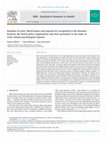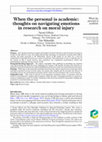Thesis Chapters by Naomi Gilhuis

Enlisting Masculinities: A comparative case study of the mobilization of masculinities in recruitment videos of the U.S. national army and private military and security contractors, 2019
The role of national military institutions as the crucial site for the (re)production of masculin... more The role of national military institutions as the crucial site for the (re)production of masculinity has been extensively studied. The recent trend of the privatization of security not only questions if national military actors are still the protagonists in conflict, but also begs the question of how the relation between masculinity and military institutions might change due to the advent of private military and security companies (PMSCs). This thesis examines in what way both prospective actors (public and private) mobilize masculinity in order to recruit. This thesis does a comparative case study of the recruitment videos of the U.S. national army and U.S. based PMSCs. The results shows that the national army and PMSCs mobilize recruits with different notions of masculinity that seem to be complementary: whereas the U.S. national army mainly displays traditional notions of hegemonic masculinity in their recruitment videos, the private contractors show notions of feminized hegemonic masculinity. Therefore, the analysis lends force to scholars suggesting that the privatization of security has brought about a re-masculinization of the national army, and a feminization of private contractors.
Keywords: PMSCs, recruitment, masculinity, content analysis
Papers by Naomi Gilhuis

SSM. Qualitative research in health, Jul 1, 2024
When police personnel suffering from work-related psychological injuries seek support and recogni... more When police personnel suffering from work-related psychological injuries seek support and recognition from their organization, a complex dynamic can unfold. This may even be experienced as morally injurious, thus adding to the initial psychological injury. This article delves into this issue in the context of Dutch police personnel, analyzing the narratives of 13 (former) police officers through the theoretical framework of Moral Injury, (mis)recognition, and bureaucracy. Their stories reveal that these officers, having learned to view their organization as their 'blue family', yearned for support and recognition, while inherent bureaucratic constraints prevented the police organization from offering genuine recognition. The result was an isolating and existencedenying experience. Bureaucratic logic tends to make the police organization approach recognition-seeking officers as suspects obligated to prove their 'sick status,' while it simultaneously creates tendencies to 'sanitize' the organization from their illness. Such an interaction becomes a Sisyphean struggle for officers, igniting a 'solidified fight mode' in them and worsening their feelings of misrecognition. Ultimately, this dynamic may be characterized as morally injurious. These findings emphasize the importance of recognition, especially for officers dealing with psychological injuries, and allow us to distinguish between affirmative recognition (perpetuating unhealthy post-injury dynamics) and transformative recognition (changing them toward meaningful change). This study thus advances the understanding of how organizations can both hinder and promote recognition and support, underscoring the pivotal role of transformative recognition to foster healing from the initial psychological injury and prevent moral injury in the injury's aftermath.

Sisyphus in Court: Moral injury and requests for recognition in the dynamic between the Dutch police organization and their personnel in the wake of work related psychological injuries , 2024
When police personnel suffering from work-related psychological injuries seek support and recogni... more When police personnel suffering from work-related psychological injuries seek support and recognition from their organization, a complex dynamic can unfold. This may even be experienced as morally injurious, thus adding to the initial psychological injury. This article delves into this issue in the context of Dutch police personnel, analyzing the narratives of 13 (former) police officers through the theoretical framework of Moral Injury, (mis)recognition, and bureaucracy. Their stories reveal that these officers, having learned to view their organization as their 'blue family', yearned for support and recognition, while inherent bureaucratic constraints prevented the police organization from offering genuine recognition. The result was an isolating and existencedenying experience. Bureaucratic logic tends to make the police organization approach recognition-seeking officers as suspects obligated to prove their 'sick status,' while it simultaneously creates tendencies to 'sanitize' the organization from their illness. Such an interaction becomes a Sisyphean struggle for officers, igniting a 'solidified fight mode' in them and worsening their feelings of misrecognition. Ultimately, this dynamic may be characterized as morally injurious. These findings emphasize the importance of recognition, especially for officers dealing with psychological injuries, and allow us to distinguish between affirmative recognition (perpetuating unhealthy post-injury dynamics) and transformative recognition (changing them toward meaningful change). This study thus advances the understanding of how organizations can both hinder and promote recognition and support, underscoring the pivotal role of transformative recognition to foster healing from the initial psychological injury and prevent moral injury in the injury's aftermath.

Qualitative Research in Organizations and Management: An International Journal
PurposeHow should researchers navigate and interpret the moral emotions evoked in them in researc... more PurposeHow should researchers navigate and interpret the moral emotions evoked in them in research on trauma? In this reflective essay, the authors discuss their experience as researchers on moral injury (MI) in veterans and police personnel in the Netherlands. Stories of MI usually do not allow for a clear-cut categorization of the affected person as a victim or perpetrator. This ambivalence, in fact, is explicitly part of the concept of MI. It means however that researchers face complicated psychological, ethical and methodological challenges during research on MI.Design/methodology/approachThe authors contemplate these challenges by describing two empirical cases demonstrating the particular moral challenges that emerge in MI research. Drawing from literature on qualitative research and emotions, the authors distil different perspectives on the role of moral emotions in research.FindingsReflecting on the ambivalent and difficult emotions the authors experienced as researchers whe...

When the personal is academic: thoughts on navigating emotions in research on moral injury, 2022
Purpose-How should researchers navigate and interpret the moral emotions evoked in them in resear... more Purpose-How should researchers navigate and interpret the moral emotions evoked in them in research on trauma? In this reflective essay, the authors discuss their experience as researchers on moral injury (MI) in veterans and police personnel in the Netherlands. Stories of MI usually do not allow for a clear-cut categorization of the affected person as a victim or perpetrator. This ambivalence, in fact, is explicitly part of the concept of MI. It means however that researchers face complicated psychological, ethical and methodological challenges during research on MI. Design/methodology/approach-The authors contemplate these challenges by describing two empirical cases demonstrating the particular moral challenges that emerge in MI research. Drawing from literature on qualitative research and emotions, the authors distil different perspectives on the role of moral emotions in research. Findings-Reflecting on the ambivalent and difficult emotions the authors experienced as researchers when listening to personal accounts of moral injury, the authors offer insights into the necessity and delicacy of navigating between the methodological potential and the ethical and psychological risks of such emotions. Originality/value-This study is relevant for all researchers examining trauma, in particular when the research is surrounded by complex ethical questions. While the issue of managing emotions in research on trauma is challenging in itself, it is further complicated when the stories related by respondents challenge the researcher's own moral beliefs and values.
Uploads
Thesis Chapters by Naomi Gilhuis
Keywords: PMSCs, recruitment, masculinity, content analysis
Papers by Naomi Gilhuis
Keywords: PMSCs, recruitment, masculinity, content analysis